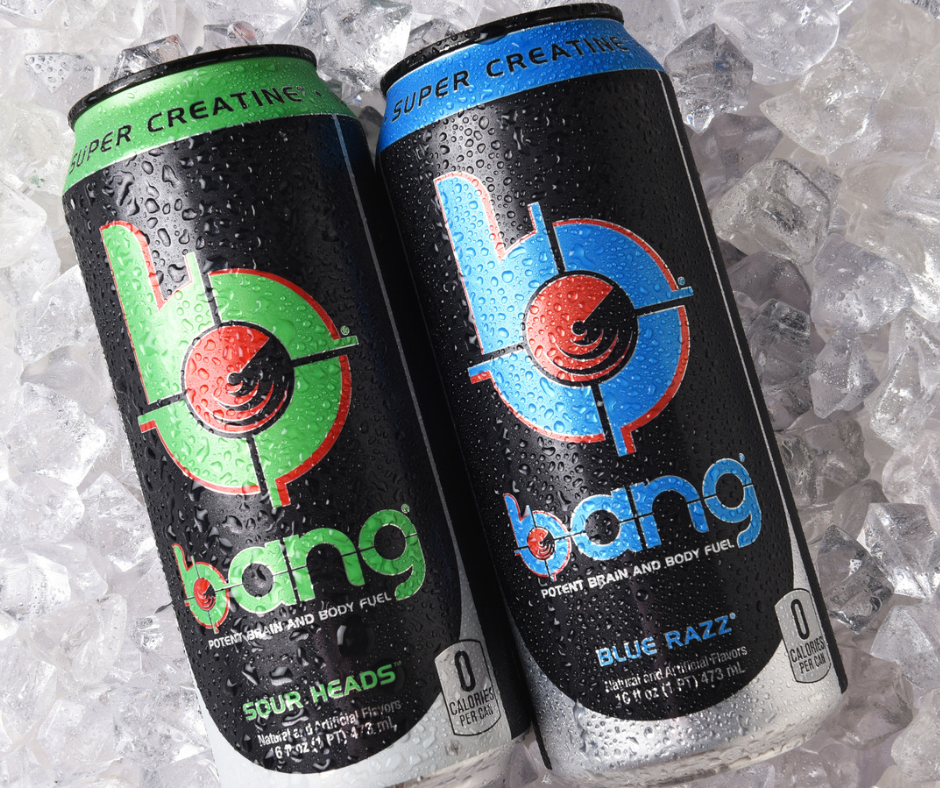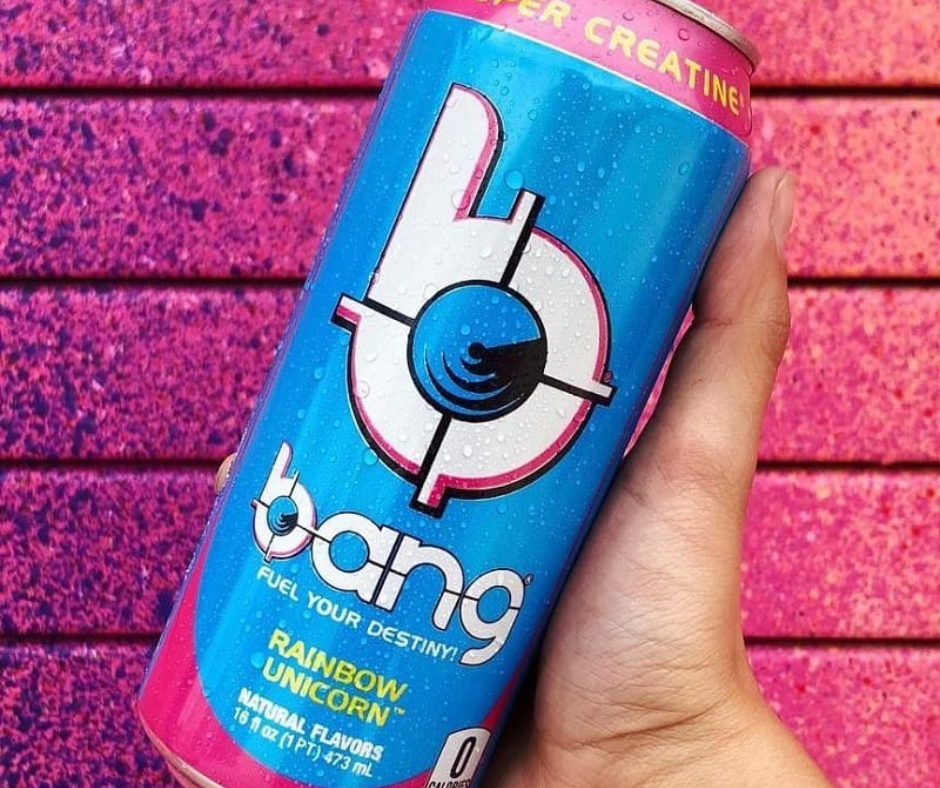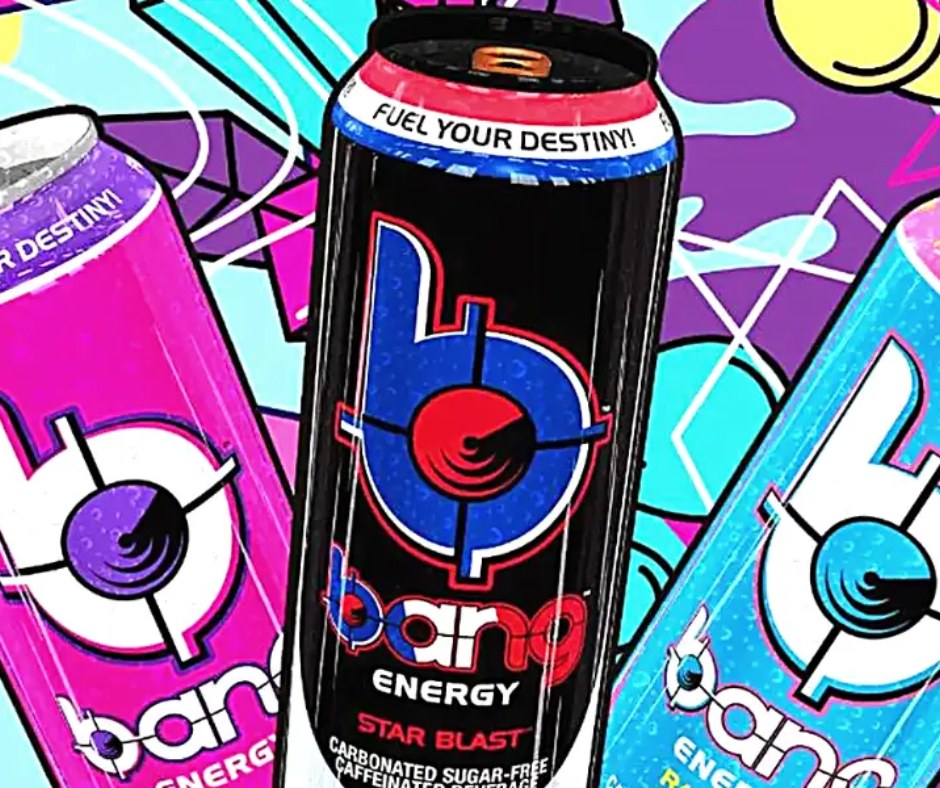Introduction
Energy drinks have become increasingly popular in recent years, offering a quick burst of energy for those needing a boost. Bang has emerged as one of the most talked-about brands among these energy drinks. However, with its rising popularity, concerns about the health effects of Bang Energy Drink have also surfaced. In this article, we aim to unveil the truth behind Bang Energy, exploring its ingredients and effects to help you answer ‘Is Bang Bad For You?‘.
The Rising Popularity Of Bang Energy Drink
Bang Energy Drink, marketed as a performance-enhancing beverage, has gained a significant following, especially among younger individuals looking for an alternative to coffee or a pre-workout supplement. Bang Energy claims to provide an explosive boost of energy. It uses artificial sweeteners to enhance its taste, making it appealing to those who want to avoid additional weight gain from sugar consumption.
One of the main ingredients in Bang is Super Creatine, which is creatine bonded to L-Leucine. Creatine is known for increasing lean muscle mass and aiding muscle recovery, making Bang Energy a popular choice among fitness enthusiasts. Coenzyme Q10 (CoQ10) is also included in Bang Energy for its potential benefits in treating heart conditions, reducing headaches, and supporting overall well-being. Additionally, Bang Energy contains various B vitamins, which can contribute to nerve and cell function.
Understanding The Concerns
While Bang Energy does offer benefits such as increased energy levels and potential muscle support, there are concerns regarding its consumption. The most significant concern is its high caffeine content. Bang Energy contains 300mg of caffeine per can, which is equivalent to the caffeine found in three cups of coffee. While this level of caffeine may provide a temporary energy boost, it can also lead to side effects such as anxiety, headaches, insomnia, and rapid heart rate. It is not recommended for caffeine-sensitive individuals with pre-existing heart conditions.
Furthermore, Bang Energy includes other ingredients that are considered questionable from a health perspective. Artificial sweeteners like sucralose have been found to decrease insulin sensitivity, which is concerning for maintaining healthy blood sugar levels. The drink also contains preservatives like sodium benzoate and potassium sorbate, which have been associated with inflammatory pathways.
It is essential to consume Bang Energy in moderation and be aware of its ingredients’ potential side effects and health concerns. While Bang Energy may provide a short-term energy boost, it is important to consider healthier alternatives and limit the consumption of energy drinks.
In conclusion, Bang Energy has gained popularity due to its ability to provide a quick energy boost and include ingredients like Super Creatine and Coenzyme Q10. However, the high caffeine content and questionable additives raise concerns about its long-term health effects. It is important to consider your caffeine tolerance and consumption and explore healthier energy supplement options. As always, consulting with a healthcare professional for personalized advice is recommended.
Is Bang Bad For You? – Unveiling The Truth Behind The Popular Energy Drink
So, Is Bang Bad For You? The answer is YES. There is a potential threat to your cardiovascular well-being when consuming an excessive quantity of Bang Energy Drinks. These beverages possess notable quantities of caffeine along with other stimulating components like guarana and taurine, heightening blood pressure, heart rate, and respiration.
Studies have proven that the elevated caffeine content in energy drinks can harm the heart, such as irregular heart rhythms like atrial fibrillation. It is crucial to consume energy drinks in moderation and have an understanding of the possible dangers to your cardiovascular health.
In the next sections, we will examine the ingredients of Bang Energy based on published medical research to determine whether it is bad for you.
Ingredients Of Bang Energy
One of the most significant ingredients in Bang Energy is caffeine. Each can of Bang Energy contains a dose of 300 milligrams (mg) of caffeine, equivalent to around 3 cups of coffee. Caffeine is a well-studied ingredient that can enhance both physical and mental energy. It can also provide athletic benefits, such as increased endurance. However, it is important to note that this dose of caffeine may not be suitable for children and individuals with high blood pressure or anxiety, as caffeine can exacerbate these conditions.
Bang Energy also contains artificial sweeteners, such as sucralose, used to enhance the drink’s taste. However, research has shown that sucralose consumption may negatively affect insulin function and decrease insulin sensitivity, which is important for maintaining healthy blood sugar levels.
Additionally, Bang Energy contains two different preservatives: sodium benzoate and potassium sorbate. These preservatives have been found to alter gene expression and contribute to the activation of inflammatory pathways, according to a 2016 medical review. It is recommended to avoid the intake of preservatives entirely.
The drink also includes added vitamins and minerals frequently in energy drink formulations. However, no medical research suggests that adding vitamins and minerals improves energy. Consuming fortified foods may push blood levels into unsafe ranges for individuals with normal levels of those vitamins and minerals.
Caffeine Content And Its Effects
The high caffeine content in Bang Energy is likely to cause an increase in subjective energy levels short-term due to its stimulatory effects. However, consuming too much caffeine in a short period may induce side effects such as anxiety, headaches, insomnia, and rapid heart rate. Limiting caffeine intake to no more than 400mg per day is recommended, and caffeine-sensitive individuals should exercise caution.
Artificial Sweeteners And Their Impact
The presence of artificial sweeteners in Bang Energy, such as sucralose, may have negative effects on insulin function and insulin sensitivity. While these sweeteners offer fewer calories than regular sugar and cause fewer spikes in blood sugar levels, excessive consumption of sugar alcohols found in the drink in a short period can lead to digestive issues like gas, diarrhea, and bloating.
Preservatives And Inflammatory Reactions
The preservatives in Bang Energy, sodium benzoate and potassium sorbate, have been found to alter gene expression and may contribute to activating inflammatory pathways. Some individuals may experience whole-body inflammatory reactions due to consuming these preservatives.
Added Vitamins And Minerals
Including added vitamins and minerals in Bang Energy has no scientific basis, as research does not support the notion that consuming added vitamins and minerals improves energy. It is recommended to avoid food products with added vitamins and minerals unless otherwise instructed by a doctor, as consuming fortified foods may lead to unsafe blood levels for individuals with normal levels of those vitamins and minerals.
Overall, while Bang Energy may provide a short-term energy boost due to its high caffeine content, it contains several questionable additive ingredients from a health perspective. It is important to consume this beverage in moderation and be aware of its potential side effects. Following your doctor’s guidance regarding energy drink consumption is advisable.
Research Findings And Reviews
With its explosive boost claims and catchy marketing, Bang Energy has become popular among younger generations as a coffee alternative or pre-workout drink. However, there have been concerns about the potential negative health effects of consuming Bang Energy. In this article, we will delve into the ingredients and effects of Bang Energy and uncover the truth behind this popular energy drink.
Registered Dietitian’s Opinion On Bang Energy
A Registered Dietitian named Addie Roberts, who runs a YouTube channel called General Wellness, has provided a comprehensive review of Bang Energy from a health perspective. She highlights the drinks’ benefits and drawbacks and shares her personal experience and nutritional information.
When comparing Bang Energy to other popular energy drinks like Monster, Red Bull, and Ghost Energy, it is worth noting that Bang Energy contains no added sugar, unlike Monster and Red Bull. Roberts also mentions that while Bang Energy includes several additive ingredients that she recommends avoiding, it has a healthier formulation than many other energy drinks on the market.
Furthermore, Roberts emphasizes natural compounds’ importance in improving physical energy and cognition. She highlights Ginkgo biloba and Panax ginseng extract as herbal supplements with research-backed energy-boosting and cognition-enhancing effects. She recommends black coffee as a healthier alternative to Bang Energy without any questionable additives for those who prefer a drink.
Comparison With Other Energy Drinks
To further understand the positioning of Bang Energy in the market, let’s compare it to other leading energy drinks:
| Energy Drink | Added Sugar | Stimulant Ingredients | Questionable Additives |
|---|---|---|---|
| Bang Energy | None | Caffeine | Artificial sweeteners, preservatives, added vitamin blends |
| Monster | High | Caffeine, Glucuronolactone, Taurine | Citric acid, vitamin blends |
| Red Bull | High | Caffeine | Citric acid, vitamin blends |
| Ghost Energy | N/A | Caffeine | Citric acid, natural flavor, sucralose, preservatives, vitamin blend |
As the table above shows, Bang Energy stands out for its absence of added sugar while still providing a significant energy boost through caffeine. It also contains fewer questionable additives compared to its competitors. However, it is important to note that all energy drinks, including Bang Energy, should be consumed in moderation.
Based on the research findings and reviews, it can be concluded that Bang Energy has drawbacks due to questionable additives. However, it offers a healthier choice for individuals seeking an energy boost without added sugar. As always, consulting with a healthcare professional for personalized advice on energy drink consumption is recommended to determine what is best for your health and well-being.
Healthier Alternatives For Energy
If you are looking for alternatives to energy drinks like Bang Energy, several options can provide a natural energy boost without the potential negative health effects. Here are a few alternatives to consider:
Natural Nootropic Supplements
Nootropics enhance cognitive function, including memory, focus, and mood. Natural nootropic supplements, such as those containing ingredients like bacopa monnieri or lion’s mane mushroom, can boost mental energy without the side effects associated with high caffeine consumption.
Ginkgo Biloba And Its Benefits
Ginkgo biloba is an herbal supplement used for centuries in traditional medicine. It is known for its potential benefits in improving cognitive function, including memory and concentration. Ginkgo biloba can provide a gentle energy boost without the high caffeine in energy drinks.
Panax Ginseng For Energy Boost
Panax ginseng is another popular herbal supplement known for its energizing effects. It has been shown to enhance physical and mental performance, improve mood, and reduce fatigue. Panax ginseng can be a natural alternative to energy drinks, providing a sustained energy boost without the potential health risks associated with high caffeine intake.
Black Coffee As An Alternative
For those who still prefer the taste and ritual of coffee, black coffee can be a healthier alternative to energy drinks. Coffee contains caffeine, which boosts energy but in moderate amounts. It is important to avoid adding excessive sugar or creamers to your coffee to maintain its health benefits.
While Bang Energy can temporarily boost energy, knowing its potential health effects is essential. The high caffeine content and additive ingredients raise concerns that may outweigh the benefits. Considering healthier alternatives like natural nootropic supplements, ginkgo biloba, Panax ginseng, or black coffee can help you maintain energy levels without compromising your overall health and well-being.
FAQs About Is Bang Bad For You
Q: Is Bang Energy bad for you?
A: Bang Energy is not inherently bad for you if consumed in moderation. However, it is important to be aware of the potential risks associated with its high caffeine content and artificial sweeteners.
Q: What are the ingredients in Bang Energy?
A: Bang Energy contains carbonated water, citric acid, natural and artificial flavors, caffeine, sodium benzoate, potassium citrate monohydrate, Essential Amino Acids (EAAs), sucralose, potassium phosphate dibasic, and vitamin C.
Q: Does Bang Energy have sugar?
A: No, Bang Energy is sugar-free. It uses artificial sweeteners like sucralose to enhance its taste without adding additional weight.
Q: How much caffeine is in Bang Energy?
A: Each can of 16 fl. oz Bang Energy contains 300mg of caffeine, which is a significant amount. Be mindful of your caffeine intake, and do not exceed the recommended daily limit of 400mg.
Q: Is it safe to drink Bang Energy every day?
A: While there is no problem with consuming Bang Energy daily, it is recommended to drink it in moderation and not exceed one can per day. It is also important to pay attention to the potential side effects of its caffeine content and heed any warnings on the labels.
Q: Does Bang Energy have any health benefits?
A: Bang Energy can provide an energy boost and contains ingredients like Super Creatine, B-Vitamins, and CoQ10 that may have certain health benefits. However, it should not be seen as a health drink; its primary benefit is its ability to increase energy levels.
Q: Can consuming Bang Energy lead to addiction?
A: Regular heavy use of energy drinks like Bang has been associated with an increased risk of substance abuse and addictive behaviors. Consuming more than 300mg of caffeine per day can also lead to addiction. It is important to consume Bang Energy responsibly and not rely on it as a sole source of energy.
Q: Are there any age restrictions on consuming Bang Energy Drink?
A: While there are no legal restrictions on the sale of energy drinks like Bang, it is not recommended for consumption by anyone under 18 years old due to its high caffeine content and potential health risks.
Q: Can drinking Bang Energy increase the risk of developing certain health conditions?
A: Drinking Bang Energy has been linked to an increased risk of developing conditions like hypertension due to its high caffeine content. Consuming large amounts of caffeine can cause various cardiovascular issues. It is important to be mindful of your caffeine and sugar intake and monitor your health.
Q: What are some alternative drinks to Bang Energy?
A: If you’re looking for alternative drinks, you can try Zevia Zero Calorie Energy, IMPOSSIBLE Energy, organic juices, kombucha, or green tea. These options provide an energy boost without the same risks associated with high caffeine content and artificial sweeteners.
Conclusion
Now you should know the answer to ‘Is Bang Bad For You?’. Bang Energy has gained significant popularity as an energy drink option, offering a high caffeine content and a variety of flavors. However, when evaluating the healthiness of Bang Energy, it is essential to consider the presence of additive ingredients and their potential impact on overall health.
Is Bang Energy Drink Unhealthy?
Based on our analysis, we would consider Bang Energy to be unhealthy. While it does provide an explosive energy boost due to its high caffeine content, it contains several questionable additive ingredients. These ingredients include artificial sweeteners, preservatives, and flavor enhancers, which may adversely affect insulin function, cause inflammatory reactions, and alter gene expression.
Consideration Of Additive Ingredients
The presence of artificial sweeteners like sucralose and sugar alcohol in Bang Energy is worth noting. While these sweeteners can provide a low-calorie alternative to regular sugar, excessive consumption can lead to digestive issues such as gas, diarrhea, and bloating. Additionally, using preservatives like sodium benzoate and potassium sorbate raises concerns about the potential activation of inflammatory pathways.
Table: Additive Ingredients in Bang Energy
| Additive Ingredient | Potential Health Impact |
|---|---|
| Artificial Sweeteners (e.g., sucralose) | Negative effect on insulin function |
| Preservatives (e.g., Sodium Benzoate, Potassium Sorbate) | Potential activation of inflammatory pathways |
| Flavor Enhancers (e.g., Artificial flavors) | Not associated with health benefits |
Exploring Healthier Options
If you’re looking for healthier energy drink alternatives, it’s essential to consider options with fewer additives and artificial ingredients. Natural energy drinks made with organic or all-natural ingredients can often offer a better choice. These drinks can provide sustained energy without the potential adverse effects associated with artificial additives.
Final Verdict And Recommendations
In conclusion, while Bang Energy may provide a temporary energy boost, it is crucial to be mindful of its additive ingredients and potential impact on health. Exploring healthier energy drink options may be better for those concerned about artificial sweeteners, preservatives, and flavor enhancers. It’s always advisable to consult with a healthcare professional before changing your dietary habits.
Bang Energy may be suitable for individuals who can tolerate high caffeine content and do not have underlying health conditions that could be exacerbated by consuming energy drinks. However, moderation is key, and it’s important to be aware of your caffeine tolerance and adhere to recommended daily limits.
Ultimately, making informed decisions about your energy drink choices and considering healthier alternatives can contribute to overall well-being and support a balanced lifestyle.

Deb Carlson at Crosslake Coffee: Join Deb at Crosslake Coffee for a delightful blend of community, caffeine, and creativity. Discover the cozy ambiance and warm hospitality that make this local coffee shop a beloved gathering spot. From expertly crafted espresso drinks to mouthwatering pastries, Deb invites you to savor every sip and bite. Stay connected with the latest updates on specials, events, and live music performances by following Deb Carlson at Crosslake Coffee on social media. Embrace the vibrant online community and share your love for great coffee and good company with fellow enthusiasts. Don’t miss out on a moment of the Crosslake Coffee experience – connect with Deb on social media today.



